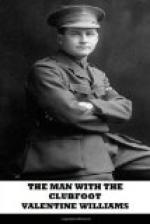These days of dreary squalor would have been unbearable if it had not been for my elucidation of the word Boonekamp, which was said to hold the clue to my brother’s address. On the wall in the cubby-hole where I slept was a tattered advertisement card of this aperitif—for such is the preparation—proclaiming it to be “Germany’s Best Cordial.” As I undressed at night, I often used to stare at this placard, wondering what connection Boonekamp could possibly have with my brother. I determined to take the first opportunity of examining the card itself. One morning, while Otto was out in the queue at the butcher’s, I slipped away from the cellar to our sleeping-place and, lighting my candle, took down the card and examined it closely. It was perfectly plain, red letters on a green background in front, white at the back.
As I was replacing the card on the nail I saw some writing in pencil on the wall where the card had hung. My heart seemed to stand still with the joy of my discovery. For the writing was in my brother’s neat, artistic hand, the words were English, and, best of all, my brother’s initials were attached. This is what I read:
(Facsimile.) 5.7.16.
“You will find me at the Cafe Regina, Duesseldorf—F.O.”
After that I felt I could bear with everything. The message awakened hope that was fast dying in my heart. At least on July 5th, Francis was alive. To that fact I clung as to a sheet-anchor. It gave me courage for the hardest part of all my experiences in Germany, those long days of waiting in that den of thieves. For I knew I must be patient. Presently, I hoped, I might extract my papers from Haase or persuade Kore, when he came back, to see me, to give me a permit that would enable me to get to Duesseldorf. But the term of my permit was fast running out and the Jew never came.
There were often moments when I longed to ask Haase or one of the others about the time my brother had served in that place. But I feared to draw attention to myself. No one asked any questions of me (questions as to personal antecedents were discouraged at Haase’s), and, as long as I remained the unpaid, useful drudge I felt that my desire for obscurity would be respected. Desultory questions about my predecessors elicited no information about Francis. The Haase establishment seemed to have had a succession of vague and shadowy retainers.
Only about Johann, whose apron I wore, did Otto become communicative.
“A stupid fellow!” he declared. “He was well off here. Haase liked him, the customers liked him, especially the ladies. But he must fall in love with Frau Hedwig (the lady at the bar), then he quarrelled with Haase and threatened him—you know, about customers who haven’t got their papers in order. The next time Johann went out, they arrested him. And he was shot at Spandau!”
“Shot?” I exclaimed. “Why?”
“As a deserter.”




